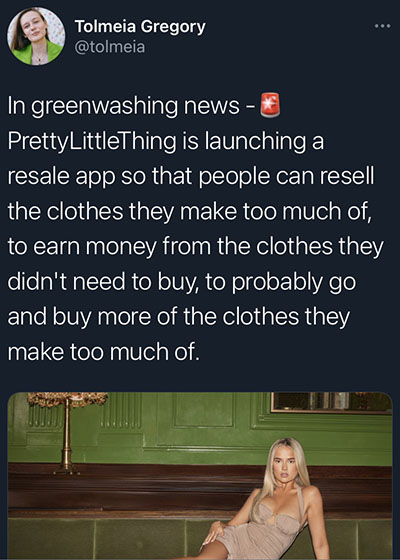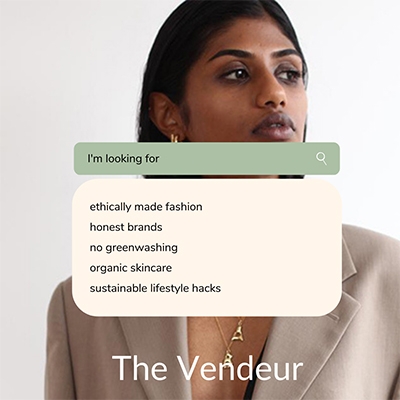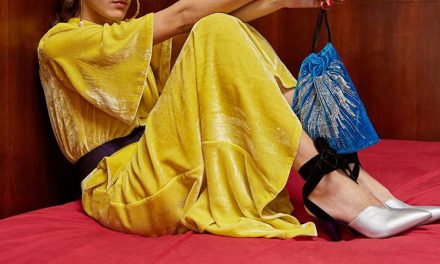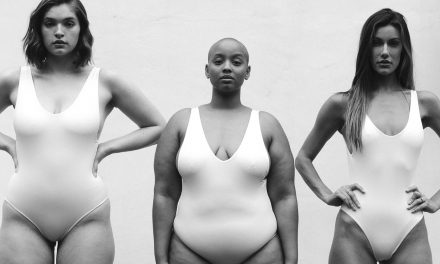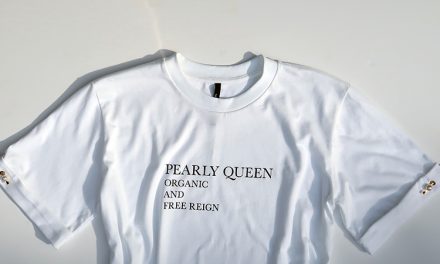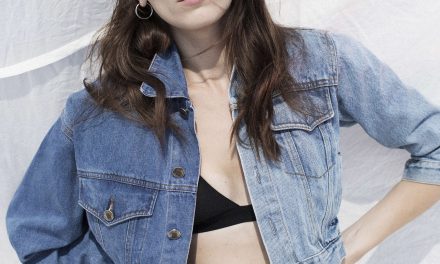Why Pretty Little Thing’s Resale App Doesn’t Make Them Sustainable
All Images: Pretty Little Thing
Pretty Little Thing want us to think they are sustainable. The launch of a resale app and new collection beg to differ.
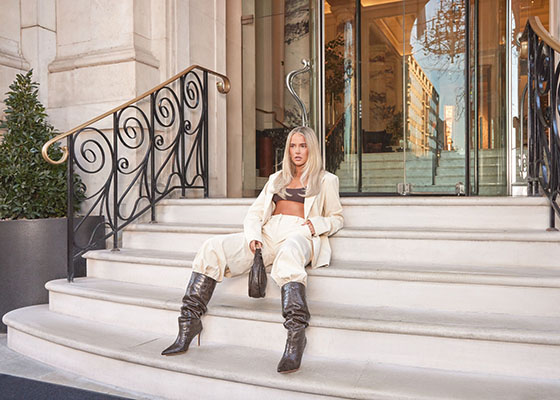
This week Pretty Little Thing, part of the Boohoo group, announced via their Creative Director Molly Mae Hague, that PLT were launching a resale app. She also revealed, in an interview with Retail Gazette, that her new collection, Pretty Little Thing x Molly Mae was the first step in ‘elevating’ the brand. Both announcements mark the first promising steps on Pretty Little Thing’s journey to be more sustainable. Whilst I try to keep things at The Vendeur positive, I thought I would share my thoughts on these latest developments with you. Because in all honesty, I smell a greenwashing rat.
In the last few years, following controversy over unfairly low wages paid to Leicester factory workers, Boohoo group (which owns PLT, as well as Boohoo, Nasty Gal, Miss Pap etc.) has decided it does care about people and the planet. Hurrah we all cried. They have hired 18 experts in sustainability, launched a ‘Recycled’ range, and even set up a roadmap, called Up.Front. So far, so good right? Unfortunately, you don’t have to dig very deeply to discover that not that much has changed, and said sustainable changes are being used to market an ‘eco friendly’ front, rather than actually reducing their impact.
Pretty Little Thing Resale App
The most exciting announcement of course has to be the app, which Molly Mae enthuses will be the next Depop. Customers can sell anything there, as well as preloved clothes from PLT, and she hopes it will encourage people to think twice before throwing clothes away. I am personally all for this. PLT has a massive reach, and if they can use something like this to help customers resell their clothes, then technically this is the first step to circularity.
Enjoying this article?
Then you'll love our Newsletters. At the beginning of each month, we send you the low down for the month ahead, featuring news and our favourite responsible products and brands you need to know about. And whats more, you receive all of this direct to your inbox before anyone else.
Where the idea falls down however is in the details. When buying a dress from PLT, for instance, this ruched dress from Molly Mae’s collection, you’re not exactly buying a timeless classic. And by charging £28, are they really encouraging a customer to love and re wear this dress, or simply to wear it once (on Instagram), then chuck it. Maybe I’m being a bit negative here, but in all honesty, resale only works when garments are well made, fit well and can be worn year after year. Just take a look at this previous article, a conversation I had with Kalkidan Legesse about her new resale platform Shwap for the low down. And as influencer Tolmeia Gregory so eloquently Tweeted, Pretty LittleThing is launching a resale app so that people can resell the clothes they make too much of, to earn money from the clothes they didn’t need to buy, to probably go and buy more of the clothes they make too much of.’
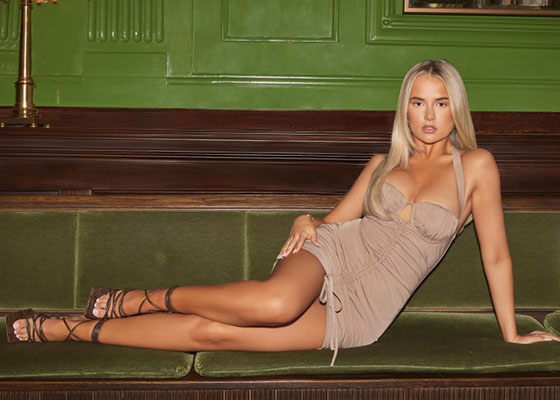
Elevating Pretty Little Thing
Ironically, Molly Mae believes that the new direction she is taking PLT in, will fix this issue. In an interview for WWD, she says, “It’s really different. It looks very high-end and I think we want to give our customer the opportunity to shop those looks, on a budget, because obviously, our customer has a budget,” She also uses the word ‘elevated’ a lot. Although in what way, I’m still a bit unclear.
The pieces in her new collection, have been created with longevity in mind, elevated classics that she hopes people will wear again and again. Sounds promising right? Unfortunately, a quick look around her new collection reveals that sadly, no, it’s not timeless, well made or considered.
In the collection is currently 340 pieces, give or take some tanning products and Molly Mae approved hair wave wands. That’s still a lot of clothes, in just one collection on the website! Selecting at random a few items throughout, I found the previously mentioned ruched dress in polyester, a pair of chiffon trousers (actually made of polyester), and a whole lot of polyurethane (PU) in the form of handbags and clothes. In fact it’s pretty hard to find any sustainable fabrics at all. Fabric mentions are generally sparse, and the origin of any cotton used is not given. So far, so disappointing.
I would however like to commend Molly Mae and the team on actively working to diversify their LFW fashion show, used to launch the collection. As well as lots of different races and body shapes appearing on the runway, models with disabilities also featured, to the glee and appreciation of PLT fans watching the show on Live Stream. PLT’s Plus range is serious, starting at a UK 16 and going up to a 30. However, this does not negate their oversight on environmental or ethical issues.
The Absence of Sustainable Fabrics
Fabrics are a big issue for Pretty Little Thing, as are its supply chain systems. Arguably, switching fabrics to more eco friendly choices that are widely available like Tencel and linen etc, as well eliminating its use of virgin polyester are the most obvious changes to make. My god theres a lot of polyester on this website. Or switching to organic or BCI cotton throughout would also be a step in the right direction.
However, lets not forget that PLT do offer a ‘sustainable range’, PLT Sustainable. Instead of simply using sustainable materials in their main collections they have of course decided to create a separate line, (more clothes). Whilst some organic cotton is used, recycled plastic bottles are their fabric of choice, some sweaters even feature the recycled yarn mixed with cotton (not organic). As we know, blended fabrics like this are no good, so really, why even bother?
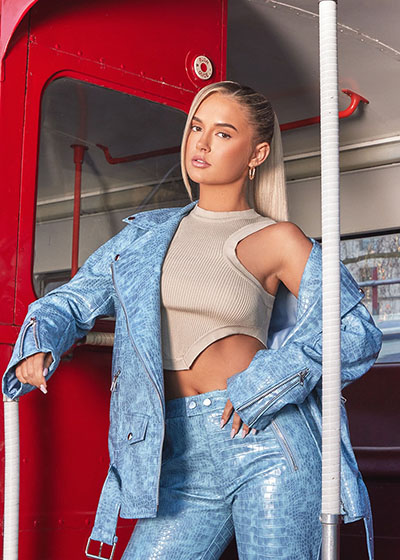
Is Recycled Polyester Sustainable?
Recycled polyester (which still sheds microplastics in our washing machines) seems to be the shining light of their sustainability policy. Which is worrying because this means that the majority of items for sale are not made from natural, biodegradable fibers, they’re made from plastic. In Boohoo’s 2021 Sustainability report they boast that they have sourced over 300,000 garments made from recycled polyester from one supplier alone in Leicester. Thats still a lot of plastic, recycled or not.
But really we get to the crux of the issue in their supply chains. In Molly Mae’s announcements, there is no mention of improvements to supply chains, or to wages paid to garment works. A scan through Boohoo’s Sustainability Report doesn’t reveal anything exciting either. While they claim to have dealt swiftly with reports that garment workers in Leicester factories supplying the group were paid abysmal wages (roughly £3.50 an hour in 2020), there is little detail as to what has actually improved in this area. They are very concerned with mapping all supply chains, but no details on wages or improvements to health and safety are mentioned. Whilst transparency through supply chains is important and helps brands make improvements, they are still only scoring a paltry 11-20% on the Fashion Revolution Transparency Index.
All of this isn’t great, but for me, the real reason I think PLT’s new announcements are greenwashing are because they use it to produce new collections. Pretty Little Thing still releases hundreds of new styles a day, some retailing as cheaply as £15 for a camel midi dress (no fabric description given). And don’t even get me started on the sales and Black Friday deals. The volume and frequency is highly problematic, as are the retail prices.
PLT isn’t alone in this. For all the sustainable claims made by fast fashion brands like Zara (at Inditex) and H&M Group, none of them will not discuss slowing down their rates of production. And until this conversation can happen in an open way, in my opinion, none of these brands can claim to be ‘sustainable’. All in all PLT can definitely work harder, as can Molly Mae. If her only real accomplishment in her tenure as Creative Director of PLT can be a collection that’s ‘elevated’ but still ‘budget, then there isn’t much hope.
Did This Put A Smile On Your Face? Why Not Subscribe?
If you enjoyed this then theres plenty more on our email newsletters that you'll love. Whether you're a sustainable newbie or an eco conscious pro, our bi monthly emails will inspire you to live sustainably and ethically.
Disclaimer: The people and models in the images featured are not associated with The Vendeur and do not endorse it or the products shown. This post may contain affiliate links. Prices correct at time of publishing.

